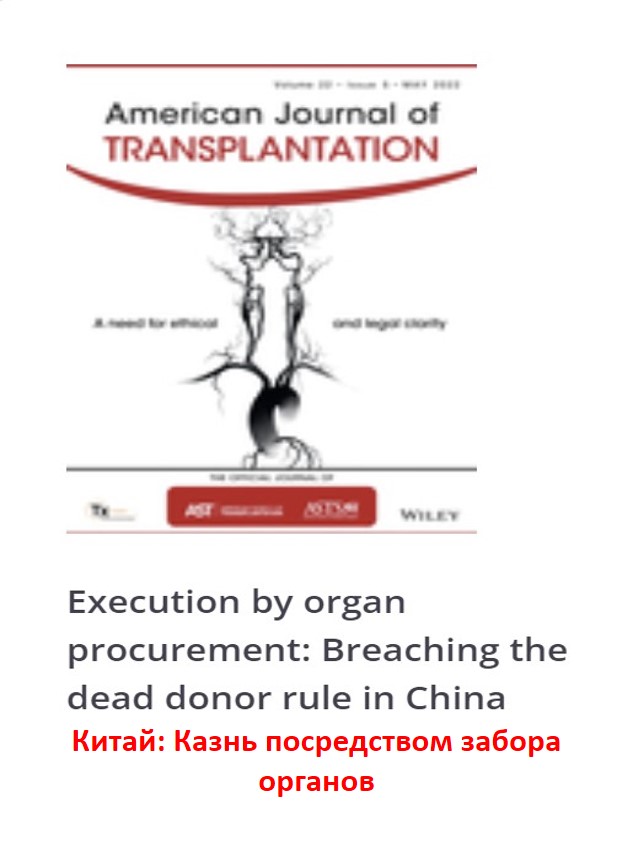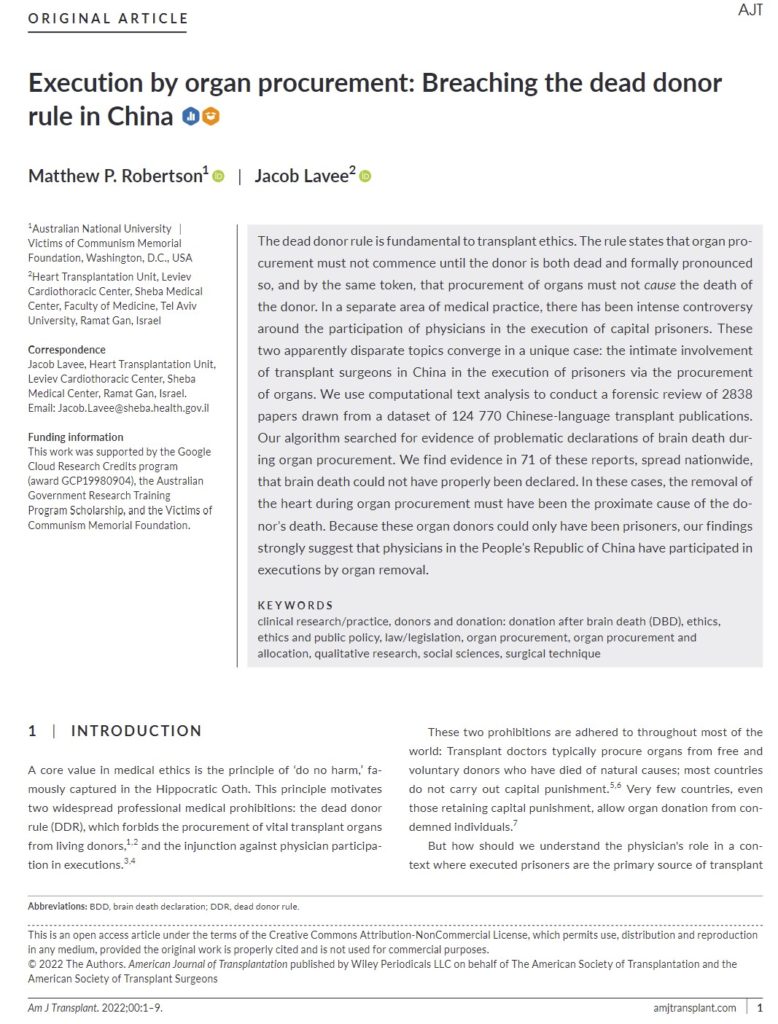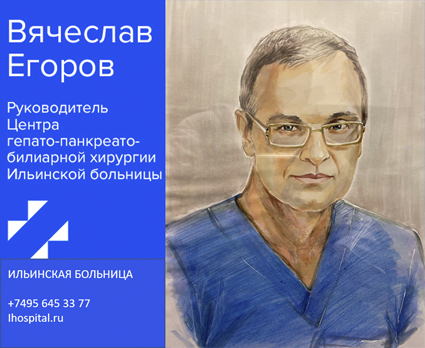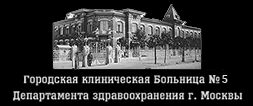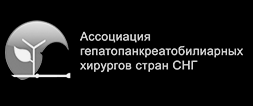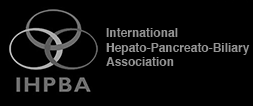Американский журнал трансплантологии (American Journal of Transplantology) опубликовал свидетельства того, что китайская программа трансплантации строилась и, видимо, строится на трансплантации органов, которые забираются у приговоренных к смерти без их согласия и не дожидаясь смерти мозга. Врачи остального мира считают это участием врачей в казни посредством забора органов у еще живого пациента, злостным нарушением обязательной КОНСТАТАЦИИ СМЕРТИ МОЗГА и правил определения смерти донора (brain death declaration (BDD) и dead donor rule (DDR))
Согласно данным организаций по контролю за соблюдением прав человека, сегодня в абсолютном выражении Китай делает больше всех в мире трансплантаций органов. Китайские больницы продолжают рекламировать трансплантации с листом ожидания равным неделям, в то время как лист ожидания в США составляет месяцы и годы. Широко рекламируется трансплантационный туризм в Китае на англо-, русско- и аробоязычных сайтах.
Официальные источники говорят о 39 000 трансплантаций в 2020 и о 50 000 к 2023 году в 29 центрах. Это больше, чем делается в США. Китайская программа трансплантации считалась бы самой успешной и самой быстро развивающейся, если бы не один МАЛЕНЬКИЙ нюанс. Несмотря на утверждения властей о том, что с 2015 года все трансплантации происходят якобы на добровольной основе, согласно представленным данным, программа почти на 95% построена на пересадке органов от приговоренных к смерти, которые не только не согласны на забор органов, но и с самим смертным приговором.
В Китае смертный приговор может считаться способом политической расправы, как это показывает опыт судебных решений по поводу Уйгурских мусульман и людей, практикующих такое безобидное учение как Фалун Гонг.
Такого рода преступления, поощряемые государством, поднимают много этических вопросов, и в частности, вопрос о том, должен ли врач быть вне политики (а все, что касается жизнедеятельности больших групп людей – это политика). По тому, что мы видим в Китае, если ты не можешь или не хочешь сопротивляться преступлениям власти, можешь легко стать соучастником казни, несмотря на априорную декларацию гуманизма профессии и личной аполитичности.
#transplantation #medicalEthics
Полный текст здесь https://onlinelibrary.wiley.com/doi/10.1111/ajt.16969
Proof Surgeons in China Procure Organs Before Brain Death
Kate Johnson April 07, 2022
In a deep dive into obscure Chinese language transplant journals, a pair of researchers from Australia and Israel have added a new layer of horror to what’s already known about forced organ harvesting in China.
Searching for documentation that vital organs are being harvested from nonconsenting executed prisoners, a practice that the China Tribunal confirmed » beyond any reasonable doubt » in 2020, Jacob Lavee, MD, an Israeli heart transplant surgeon, and Matthew Roberston, a PhD student at Australian National University, uncovered something even more shocking: that vital organs are being explanted from patients who are still alive.
«We have shown for the first time that the transplant surgeons are the executioners — that the mode of execution is organ procurement. These are self-admissions of executing the patient,» Lavee told Medscape Medical News. «Up until now, there has been what we call circumstantial evidence of this, but our paper is what you’d call the smoking gun because it’s in the words of the physicians themselves that they are doing it. In the words of these surgeons, intubation was done only after the beginning of surgery, which means the patients were breathing spontaneously up until the moment the operation started…meaning they were not brain dead.»
The research, published in the American Journal of Transplantation, involved intricate analysis of thousands of Chinese language transplant articles and identified 71 articles in which transplant surgeons describe starting organ procurement surgery before declaring their patients brain dead.
«What we found were improper, illegitimate, nonexistent, or false declarations of brain death,» Robertson told Medscape. He explained that this violates what’s known as the dead donor rule, which is fundamental in transplant ethics. «The surgeons wrote that the donor was brain dead, but according to everything we know about medical science, they could not possibly have been brain dead because there was no apnea test performed. Brain death is not just something you say, there’s this whole battery of tests, and the key is the apnea test, [in which] the patient is already intubated and ventilated, they turn the machine off, and they’re looking for carbon dioxide in the blood above a certain level.»
Robertson and Lavee have painstakingly documented «incriminating sentences» in each of the 71 articles proving that brain death had not occurred before the organ explantation procedure began. «There were two criteria by which we claimed a problematic brain death declaration,» said Robertson, who translated the Chinese. «One was where the patient was not ventilated and was only intubated after they were declared brain dead; the other was that the intubation took place immediately prior to the surgery beginning.»
«It was mind-boggling,» said Lavee, from Tel Aviv University. «When I first started reading, my initial reaction is, ‘This can’t be.’ I read it once, and again, and I insisted that Matt get another independent translation of the Chinese just to be sure. I told him, ‘There’s no way a physician, a surgeon could write this — it doesn’t make sense.’ But the more of these papers we read, we saw it was a pattern — and they didn’t come out of a single medical center, they are spread all over China.»
For the analysis, Robertson wrote code and customized an algorithm to examine 124,770 medical articles from official Chinese databases between 1980 and 2020. The 71 articles revealing cases involving problematic brain death came from 56 hospitals (of which 12 were military) in 33 cities across 15 provinces, they report.
